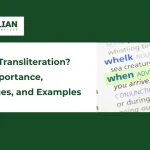A visa application is as exciting as daunting. While most applicants concentrate on passports, forms, and interviews, statistics show that the Australian government cancelled over 35,000 student visas, citing “bogus” bank statements and fraudulent financial documentation as primary reasons.
Evidently, your financial documents play a significant role in visa approval. Thus, if you are willing to know how to prepare financial documents for your visa application in Australia, this blog is for you.
Why Is Financial Documentation Considered a Critical Component of a Visa Application?

Providing financial documentation like a Bank Statement Translation during a visa application is not a formality. It is important because authorities heavily rely on assessing your credibility, intentions, and ability to adhere to the visa regulations of the country of migration. Therefore, if you fail to provide the correct documentation, your visa application can be rejected. Here’s why each aspect is so crucial:
Proof of Sufficient Funds:
The most direct and fundamental requirement is the proof of sufficient funds. Australian Governments want assurance that you can cover your living expenses, tuition fees (if applicable), and return travel. Furthermore, you will not become a financial burden on their public resources or need to work illegally.
For instance,
Minimum Amount (2025): For a single student, the minimum living cost required is AUD 29,710 per year, plus tuition fees for one year (the amount varies by university and course) and return airfare.
Evidence of Stable Income:
Beyond just a lump sum in an account, visa authorities look for proof of a consistent and reliable source of income. This showcases your long-term financial stability and your ties to your home country.
For employed individuals, this might be salary slips and employment letters. For business owners, this may include tax returns and profit and loss statements. Stable income reassures officials that the funds you possess are genuinely earned. Moreover, you have a reason to return home.
Understanding Specific Requirements:
We cannot stress this more. Every country, and indeed every visa category within a country, has distinct financial requirements. What’s sufficient for a tourist visa to one nation might be entirely inadequate for a student visa to another.
Always consult the official Australian immigration website for the most accurate information. Missing details, such as minimum balance, fund duration, or acceptable income proof, often lead to delays or refusals.
Documentation of Financial Sponsorship (If Applicable):
For applicants who are not self-funding their trip (which is typical for students, minors, or those with dependents), a robust affidavit of support from a sponsor is essential. This documentation proves that a third party (e.g., a parent, guardian, or organisation) has the financial capacity and commitment to cover your expenses.
It requires not only the sponsor’s declaration but also their financial documents to demonstrate their ability to uphold this commitment, thereby transferring the burden of proof from you to them.
This Is How to Prepare Financial Documents for Your Visa Application!
What Is the First Step an Applicant Should Take before Gathering Financial Documents?
Before you even think about opening or unveiling the money mindset, a journey through your bank statement or gathering pay stubs, the absolute first and most critical step an applicant should take is to thoroughly research and understand the specific financial requirements of Australia and its visa category.
This means:
| What to Do? | Why Do This? |
|---|---|
| Consult the Official Immigration Website | This is your primary and most reliable source of information. Do not rely solely on third-party websites or forums, as regulations are subject to frequent changes. |
| Identify Your Visa Type | Are you applying for a student visa, tourist visa, work visa, family visa, or another type of visa? Each has unique financial criteria. |
| Note Minimum Fund Requirements | Determine the exact minimum amount of funds you need to demonstrate. This often includes living expenses, tuition fees (if applicable), and return airfare. Pay close attention to the currency specified (e.g., AUD, USD, GBP, EUR). |
| Understand Fund Holding Period | You must have funds in your account for a specific duration (e.g., 3-6 months) before your application is processed. This proves the funds are genuinely yours and not a recent, temporary deposit. |
| Identify Acceptable Forms of Proof | What types of financial documents are accepted? Is it just bank statements, or do they also accept fixed deposits, property deeds, or investment portfolios? |
| Clarify Income Source Requirements | What kind of proof do they need for your income? Salary slips, tax returns, business registration documents, pension statements? |
| Sponsorship Guidelines | If you're being sponsored, what specific documents does the sponsor need to provide? Their bank statements, income proof, an affidavit of support, a letter of commitment? |
Take this crucial first step to ensure every document meets visa requirements, saving time, effort, and avoiding rejection.
What Types of Financial Documents Are Commonly Required for a Visa Application?

Bank Statements:
The power of your Bank statements is paramount as direct evidence of your available funds. They provide a historical record of your financial activity and balances over a specific period. If your statement is in a foreign language, you must get a certified Bank Statement Translation for quick approval.
- What to include: Typically, the Department of Home Affairs requires statements from your personal savings and/or checking accounts. Funds should generally be easily accessible.
- Key details: Ensure statements clearly show your name, account number, bank logo, and transaction history. The closing balance, and importantly, the average balance over the required period, are crucial.
- Duration: For many Australian visa subclasses, particularly student visas, funds must be demonstrated to have been held for at least three consecutive months immediately preceding the lodgement of the application. This proves the funds are genuinely yours and not a recent, temporary deposit.
- Minimum Funds: For instance, a single student visa applicant needs to demonstrate access to AUD 29,710 per year for living costs (as of 2025), plus one year’s tuition fees and return airfare. For other visa types, the required amount will be specified in the visa subclass guidelines.
- Certification: Statements should ideally be official bank-issued documents. If using online printouts, they often need to be stamped or attested by the bank to verify their authenticity.
Proof of Income:
Proof of income shows you can generate funds consistently. This demonstrates your financial stability and ties to your home country, which is highly valued by Australian immigration authorities. This can vary significantly based on your employment status.
For Employed Applicants:
- Salary Slips/Pay Stubs: Usually for the last 3-6 months.
- Employment Letter: An official letter from your employer on company letterhead, stating your position, salary, date of employment, and confirming your leave (if applicable for a temporary visa).
- Bank Statements: Clearly showing regular salary credits from your employer.
- Income Tax Certificates/Statements: Depending on your home country’s tax system, these can corroborate your declared income.
If an Applicant Is Self-Employed, What Specific Documents Can They Submit as Proof of Income?
Self-employed individuals must provide documents that clearly demonstrate the profitability and stability of their business, as Australian authorities scrutinise these.
- Business Registration Documents: Proof of your business’s legal existence.
- Company Bank Statements: For the last 6-12 months, showing business transactions and healthy cash flow.
- Audited Financial Statements: Profit and Loss statements, balance sheets, especially for the last 2-3 years, prepared by a qualified accountant.
- Income Tax Returns: Both personal and business tax returns (see below for more details).
- Client Contracts/Invoices: Evidence of ongoing work and income generation.
- Professional Licenses: If applicable to your trade or profession.
Tax Returns:
Tax returns (personal and/or business) are powerful documents for Australian visa applications. They are officially filed with government bodies and provide a verifiable record of your declared income over a fiscal year.
- What to include: Copies of your income tax returns for the past 2-3 years are commonly requested, particularly for work or skilled migration visas.
Why Are Tax Returns Valuable as Financial Documentation for a Visa Application?
Tax returns are highly valued because they:
- Verify Income: They confirm the income you’ve reported to your national tax authority, lending significant credibility to your stated earnings.
- Demonstrate Consistency: A history of filing tax returns with consistent income shows long-term financial stability. Authorities prefer a legitimate source of funds over a sudden, unexplained increase in wealth.
- Show Compliance: It indicates you are a law-abiding citizen in your home country, reflecting positively on your overall character assessment.
- Support Other Documents: They serve to corroborate the information provided in salary slips, employment letters, or business financial statements.
Proof of Assets:
While not always a primary requirement for demonstrating immediate funds, proof of significant assets can strengthen your application. This shows overall financial stability and strong ties to your home country. This can be particularly useful if your liquid funds are just at the minimum.
- Examples: Property deeds (real estate), fixed deposit certificates, investment portfolios (including bonds, stocks, and mutual funds), and provident fund statements.
- Purpose: These show that you have substantial wealth or property that ties you to your home country and reduces the likelihood of you overstaying your visa. They can also serve as a backup emergency fund.
Affidavit of Support:
This financial assistance document is crucial when someone sponsors your trip to Australia, which is common for student visas or dependent applications.
- What it is: A legally sworn statement where the sponsor declares their intention to support you during your stay in Australia financially and accepts responsibility for your expenses. This often needs to be notarised or witnessed.
- Sponsor’s Documents: The affidavit must be accompanied by the sponsor’s own comprehensive financial documents, including their bank statements (often for 3-6 months), proof of income (pay slips, employment letter, tax returns), and possibly evidence of assets, to demonstrate their capacity to fulfil their commitment unequivocally.
- Relationship Proof: You will also need to provide documentation that proves your genuine relationship with the sponsor (e.g., a birth certificate, marriage certificate, or family register). Australian immigration must recognise the relationship as valid.
Now that you know all the documents you need for the visa approval process, please note that you must opt for the Financial Translation service for all documents that are not in English.
How Should Applicants Professionally Format Their Financial Documents?
Clear Labels:
Clearly label every document. This makes it easy for the officer to locate specific information.
For physical applications, use separator sheets or sticky tabs with headings like:

Making Copies:
Always submit high-quality, legible copies of your original documents. Never send original documents unless explicitly requested, as they may not be returned.
If submitting physical copies, ensure they are clear and legible. For digital submissions, use high-resolution scans or PDF versions. If any document is in a language other than English, it must be accompanied by a certified English translation.
Logical Organisation:
Arrange your documents in a logical and systematic order. A common and practical approach is to group similar documents (e.g., all bank statements, then all income proofs, then all tax returns).
Follow the order as specified in the visa checklist, if one is provided. Consider creating a list, a table of contents, or an index for larger submissions to guide the visa officer through your package.
Should I Include a Cover Letter with My Financial Documents for Visa Application Australia?
Yes, absolutely. While not always a mandatory requirement, we highly recommend that you include a concise and well-written cover letter with your financial documents. It serves as a professional introduction and provides context to your application package.
- What it does: A cover letter allows you to briefly explain your financial situation, highlight the key documents included, and address any potential complexities or unique circumstances (e.g., a recent large deposit with a clear explanation). It acts as a roadmap for the visa officer.

Benefits: It shows your organisational skills, attention to detail, and a proactive approach, which can leave a positive impression on the assessing officer.
Why Is Honesty and Transparency Crucial When Preparing Financial Documents for Visa Application Australia?
Honesty and transparency do not just amount to ethical principles; they are absolutely paramount when preparing financial documents for a visa application. The integrity of your application determines its success or failure.
- Building Trust: Visa authorities operate on trust. Presenting genuine, unaltered, and truthful documents builds trust with the assessing officer. Any attempt to misrepresent your financial situation, however small, can instantly erode that trust.
- Severe Consequences for Misrepresentation: The Australian Department of Home Affairs has a zero-tolerance policy for fraudulent documentation. You will have to face severe consequences if the official finds that any of your documents is false, or misleading (e.g., “bogus” bank statements).
- Visa Refusal: They will refuse your current application.
- Exclusion Period: You may also face an “exclusion period” (typically 3 to 10 years), which means you will not be eligible to apply for any Australian visa during this time.
- Future Impact: A history of visa fraud can negatively impact future visa applications to Australia and potentially other countries as well.
- Legitimacy of Funds: Officers are trained to spot inconsistencies and will verify information. Funds that suddenly appear in an account without a clear, legitimate source or bank statements that show signs of tampering will raise red flags and lead to intensive scrutiny or outright refusal.
- Demonstrating Good Character: Submitting honest documentation reflects positively on your character, indicating you are a law-abiding individual capable of adhering to immigration laws.
Always ensure every piece of financial documentation is authentic, accurate, and truly reflects your financial standing. It’s better to address a perceived weakness honestly in a cover letter than to attempt to conceal it with fraudulent documents.
When to Seek Expert Help: Navigating Complex Financial Requirements

While this guide provides comprehensive information, there are specific situations where seeking expert help from a qualified migration agent or financial advisor can be invaluable. Dealing with complex financial requirements can be daunting, and professional assistance can save you time, stress, and potential pitfalls.
- Complex Financial Structures: If your funds are spread across multiple accounts, investments, or involve complex business finances, an expert can help present this information clearly and persuasively.
- Multiple Sponsors or Unusual Sponsorship: If you have multiple sponsors or an unusual sponsorship arrangement (e.g., an organisational sponsor or a non-traditional family relationship), professional advice can ensure that all necessary documentation and declarations are correctly gathered.
- Borderline Funds: If your available funds are just at the minimum requirement, an expert can advise on how to present your financial capacity best and include any supplementary evidence of assets to strengthen your case.
- Previous Visa Refusal: If you’ve had a prior visa application refused due to financial reasons, an expert can help you understand where your previous application went wrong and guide you in preparing a stronger, compliant application.
- Unique Financial Circumstances: Any unusual financial situation, such as recent large transactions, inherited funds, or funds held in a non-standard format, can benefit from expert guidance on how to explain and document them accurately.
- Language Barriers or Documentation Issues: If you’re struggling with understanding specific requirements due to language barriers, or if obtaining certain documents from your home country is challenging, a professional can offer solutions and certified translation services.
An experienced professional can provide tailored advice, ensure all documents meet the specific visa subclass requirements, and help you present your financial situation in the most favourable and compliant way possible, significantly increasing your chances of a successful application.
Conclusion: Your Pathway to a Successful Visa Application
The preparation of the financial documentation process for a visa application, particularly for a country like Australia, is undoubtedly a challenging and meticulous. However, by diligently following the steps outlined in this guide, thoroughly understanding specific requirements, gathering the right documents, and maintaining professional formatting while upholding absolute honesty, you significantly enhance your chances of success.
With careful attention to detail and, when necessary, expert support, you can confidently navigate this critical aspect of your application, paving your pathway to a successful visa approval and the start of your journey to Australia.
Frequently Asked Questions
How Do You Demonstrate Proof of Funds?
- Submit official bank statements (3–6 months) showing adequate accessible funds.
- Supplement with documents like payslips, loan letters, investment portfolios, or fixed deposit certificates.
What Is Proof of Sufficient Funds for a Visa to Australia?
Proof of sufficient funds (Australian visa) requires proving that you have sufficient or enough funds to cover your living expenses, tuition fees (if applicable), and return airfare, without relying on public funds or working illegally. For a single student visa applicant as of 2025, the minimum requirement is AUD 29,710 per year for living costs, plus one year’s tuition fees and return airfare.
How Much Funds Do I Need to Show for an Australian Visa?
The exact amount of funds required to support an Australian visa application varies significantly by visa subclass.
For example, a single student visa applicant (as of 2025) needs to show AUD 29,710 for living costs, plus tuition and airfare. For other visa types (e.g., tourist, skilled migration), you must consult the specific Department of Home Affairs guidelines for that visa subclass to determine the precise financial requirement.
How Much Bank Balance Is Required for an Australia Tourist Visa?
The Australian Department of Home Affairs does not specify a single, fixed minimum bank balance for a tourist visa (Visitor Visa subclass 600).
Instead, you must show “sufficient funds” to cover your stay, which will depend on the duration of your trip, your planned activities, and whether you have accommodation pre-booked.
We recommend showing the funds that realistically cover your expenses here. It is always best to check the latest guidance on the official Department of Home Affairs website for the most accurate and up-to-date information specific to your circumstances.
- NAATI Translation Cost 2026: A Complete Pricing Guide for Australia - January 16, 2026
- Filipino Language: History And Unrevealed Interesting Facts - January 13, 2026
- How to Become a NAATI Translator or Interpreter in 2026? - December 11, 2025







